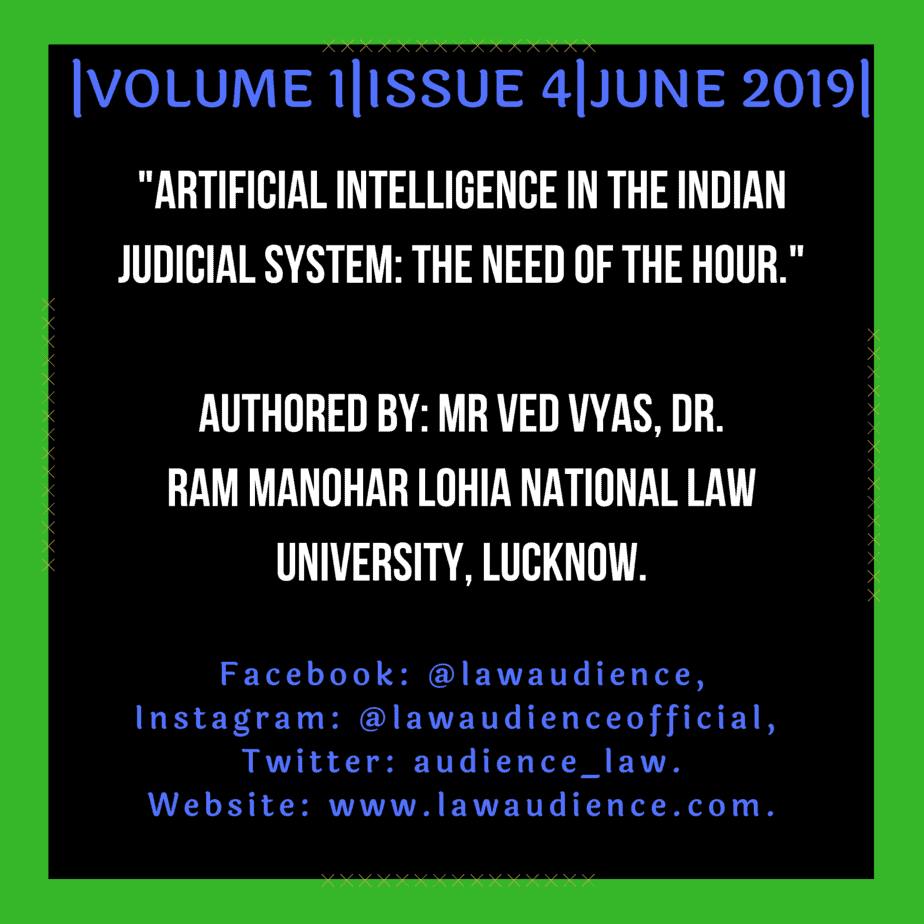Authored By: Mr. Ved Vyas, Dr. Ram Manohar Lohia National Law University, Lucknow.
I. ABSTRACT:
“Progression in technology is emerging at a great pace and considering the rate of progression the question arose about the suitability of the substitution of human skills by machines through Artificial Intelligence that is being bantered at present. According to a recent report from National Judicial Data Grid (District and Taluka Courts of India), it is indicated that over 2.6 crore cases are unresolved and unsettled in the Local Courts, District Courts and High Courts and considering the Supreme Court around 9% of the cases are pending for more than 10 years. On an average 30,000 cases are recorded and 28,000 cases are arbitrated on a daily basis. This implies that there is a deficit of 2000 cases that are left unsettled every day. That leads to a cumulative backlog of 7.3 lack cases per year.[1] So, to curb the issue of pendency of cases, this paper discusses the need and the constitutionality of Artificial Intelligence which simply means to assist the magistrates and judges in clearing up the backlog of the cases by delivering the judgments speedily.
The paper discusses the advancements in technology which is assisting legal professionals in their work. Artificial Intelligence has been playing a vital role for advocates, researchers and students in legal research and in summarization for showing the most relevant case laws and even assisting the judges in conducting crisp and fast research for delivering judgments. The paper further discusses the impact of Artificial Intelligence technology on Indian Judicial System. With the capable selection of Artificial Intelligence in the Indian Legal Framework, it can bring about a radical revolution to ensure the justice is neither delayed nor denied.”
II. INTRODUCTION:
Progress in technology is happening at an unbelievably high rate and there is no denying the fact that many wonders about the substitution of human skills by machines through Artificial Intelligence. The expression Artificial Intelligence was first authored by John McCarthy, an American scientist of computer in the year 1956.[2] According to Merriam Webster’s dictionary, “Artificial intelligence is a branch of computer science dealing with the simulation of intelligent behaviour in computers”.[3] Artificial intelligence has transformed the legal sector drastically and has made this industry a consumer-centric one. The changes are sundry where paperwork, documentation and data-management, largely practiced by lawyers, are supplanted by software solutions. New lopes of progress in the legal sector have developed: millennial legal advisors are changing the work culture; technologists are presenting artificial intelligence.[4] Globalization led the legal sector to continuous growth in technology.[5] Keeping aside the administrations which rely on the involvement and judgment of a human, everything else is available to being supplanted by technology. But in countries like U.S.A. and U.K. Artificial Intelligence in the legal sector have reached heights, so much so that they are advancing the technology to help judges in decision making.[6]
This could be a bizarre advancement in Indian context as the legal sector could be in an employment crisis in the coming years. To curb the issue of backlog of cases, the Indian Judicial System should increase judicial posts for each state until this issue comes under control. The Indian Judicial System is utilizing Artificial Intelligence in a very prolific way as it is user-friendly and effective, especially for the youth. Artificial Intelligence is being used by the Indian Judicial System in numerous ways such as legal research, due diligence, and contract generation. Its impact can be clearly seen in the Indian Judicial System wherein 2017, Cyril Amarchand Mangaldas became the first law firm to have consented to an agreement with a Canada-based machine learning software provider popularly known as ‘Kira Systems’ to enhance the productivity, exactness and speed of the association’s conveyance display for lawful administrations and for legal research.[7] The Supreme Court of India has also digitalized their records for the first time, which in reality has come about into an appropriation of Artificial Intelligence innovation by more law offices as Artificial Intelligence utilizes the online data accessible.[8]
III. CONSTITUTIONALITY OF ARTIFICIAL INTELLIGENCE:
The first step towards India’s Artificial Intelligence framework was the AI Task Force Report, headed by Tata Sons Chairman, N. Chandrasekaran, to study the use of artificial intelligence.[9] It was set up by the Ministry of Commerce and Industry to use AI for financial advantages, and give strategy proposals on sending of AI to India and to see its feasibility in India. The Task Force’s Report, discharged on March 21, 2018, is an after-effect of the consolidated skill of individuals from various divisions and it also analyses how AI will profit India.[10] As far as setting up a moral AI structure, the Task Force proposes measures, for example, making AI reasonable, transparent, and auditable for predispositions. The Report tends to suggest that with the expansion in human and AI collaboration right now there is a need to have a new gauge set for the arrangement of AI.[11]
After that India’s strategy document was published by NITI Aayog on June 4, 2018, known as National Strategy for Artificial Intelligence #AIFORALL and it recognized five priority sectors for utilizing AI: Health-care, Agriculture, Education, Smart Cities and Infrastructure and Smart Mobility and Transportation. Furthermore, it threw some light on privacy challenges, data protection, and ethical and security issues related to Artificial Intelligence.[12]
Information is one of the essential drivers of AI arrangements, and consequently fitting treatment of information, guaranteeing protection and security is of prime significance. One of the key parts of our aspiration of #AIforAll incorporates responsible AI, i.e., ensuring adequate privacy, data protection and offsetting moral contemplations with a requirement for advancement.[13]
Major concerns encompassing AI is of data protection. After the Analytica data scandal which was a major political scandal where one political party of U.S.A. contracted Cambridge Analytica to download the data of the officials of the opponent party through Facebook.[14]
Each AI interface depends altogether on the information which is being sustained into its framework. In contrast to other software, where human directions lead to results, AI frameworks build up their decision making based on mechanical analysis of user data over the time.[15]
The development of informational privacy and data protection has turned out to be progressively unmistakable in light of the on-going Aadhaar judgment of the Supreme Court of India in the case of K.S. Puttaswamy and Anr. v Union of India and Ors,[16] wherein the right to privacy was held to be a fundamental right guaranteed under the Constitution of India. Thinking about this advancement, the Government of India set up a committee to investigate the data protection issues and to draft an exhaustive data protection framework, which is innovation nonpartisan and which manages conspicuous issues, for example, the developing utilization of AI in India.[17]
Given that the advancement of AI is still at an early stage, the difficulty is to distinguish a fitting lawful reaction. There are two schools of thought on building up a responsive regulatory framework for AI. On one hand, it is trusted that static ex-ante control through customary instruments of direction, for example, item permitting, innovation and improvement oversight, and tortious risk for AI would not have the capacity to manage a fast-developing innovation like the AI. Moreover, it is trusted that establishing the frameworks of a dynamic administrative system while the innovation is still to a great extent reliant on people will address wellbeing, moral and responsibility concerns, and will not pose significant threats to the innovation and expansion of AI.[18]
A proactive administrative methodology towards AI will energize tackling of AI, and in the meantime, guarantee the assurance of the rights of citizens in terms of privacy and liability.[19] Artificial intelligence is being utilized without an administrative or lawful structure that tends to issues of risk, information assurance, security and mechanical and security measures.[20] India needs a stringent framework to regulate Artificial Intelligence to protect an individual’s data, liability issues, and privacy and safety standards.
IV. ADVANCEMENT IN TECHNOLOGY TO ASSIST LEGAL PROFESSIONALS:
Artificial Intelligence is scooping its routes into the lawful calling and there are various programming system accessible in the business sector which can supplant the dreary and dull work done by the legal advisors. Man-made intelligence helps the attorneys in the mundane and routine employments which in fact spares their time and further help them focus on critical aspects.
IV.I ARTIFICIAL INTELLIGENCE IN DECISION MAKING:
Artificial intelligence is characterized as the capacity of machines and frameworks to obtain and apply learning and to complete smart conduct. This incorporates an assortment of intellectual undertakings and one of the major tasks is decision making.[21] India is not that technologically sound as the U.S.A., U.K. and Canada. So, India does try to push technology to that level where Artificial Intelligence could help in the decision-making process. Reasonably, India would not adopt this technology in near future because it can lead to employment crisis and more importantly, India cannot merely just rely upon Artificial Intelligence to decide a pending case that involves plethora of aspects to be considered as it has the potential of deciding what life holds in future of all those affected by that judgment.
IV.II ARTIFICIAL INTELLIGENCE IN LEGAL RESEARCH:
Advocates in common law wards (India, Canada, US, and so forth) utilize case-laws decided by the higher legal executive (High Courts and The Hon’ble Supreme Court of India) as a point of reference in other consequent instances of comparative or indistinguishable conditions.[22] A judge, magistrate, legal practitioner, law student invest a ton of energy and time in legal research. It takes a long time for new legal counsellors to figure out how to do legitimate research, how to locate the right lawful specialist which could enable them to help their contention.[23] Exact research assumes an urgent job in winning the case. Improvement of AI programming is a guide to the legal counsellors in this particular territory. There are a few programming systems accessible in the market which assists the legal advisor in finding significant case laws and relevant laws and rules.[24] AI is very useful in legal research as it reduces the time consumption and provides relevant case laws in one click and also assists judges and magistrates in doing crisp and fast research for delivering judgments speedily.
IV.III ARTIFICIAL INTELLIGENCE IN DOCUMENT REVIEW:
Cyril Amarchand Mangaldas is the first leading law firm in India to make an open declaration, expressing their expectation to embrace AI innovation for their specific legitimate procedure exercises. In concurrence with the Kira Systems, a Canada based innovation organization, the firm expects on utilizing Kira machine-learning programming for more prominent mechanization of its due diligence and the value-based practices, which they state will introduce another time of effectiveness and precision for the advantage of their clients.[25] The software additionally implies to analyse and distinguish risky provisions in the agreements. It offers a promising way to deal with the survey of another party’s agreements preceding an arrangement. For now, in any case, the product is just quite compelling and efficient in auditing an extensive volume of comparative contracts.[26]
V. IMPACT OF ARTIFICIAL INTELLIGENCE TECHNOLOGY ON THE INDIAN JUDICIAL SYSTEM:
Almost every industry is endeavouring to anticipate the effect of AI, with some preparing themselves for prospective changes that could require the re-examination of their organizations discount. Even the legal sector is not immune to changes that will take place with the occurrence of Artificial Intelligence technologies.
The need of Artificial Intelligence in the Indian judicial system is grave. Considering the cases that are unsettled and unresolved Artificial Intelligence would play a vital role in clearing up the backlog. It is imperative that the Executive branch and the Hon’ble Judiciary’s managerial branch act in accordance with some basic honesty agreement to give lawful goals to these cases, particularly the ones pending for over 10 years and those pending for over 5 years.[27] One viewpoint, in any case, that goes unnoticed is the sheer amount of legal research that should be embraced, by legal advisors to exhibit their case. One can say that in the event that legal research turned out to be very proficient and quick, at that point the procedure of delivery of justice would likewise accelerate. ‘LegitQuest’, a legal tech company based in New Delhi believe that by simplifying and advancing the legal research, less time will be spent on research. That would lead to conduct expeditious and precise research not only for lawyers but also for judges to deliver the judgments speedily which would certainly help in reducing the backlog of cases to a great extent. [28]
A meeting was held at New Delhi under the Chairmanship of Hon’ble Mr. Justice Madan B. Lokur, Judge-in-Charge, e-Committee, Supreme Court of India. ‘LegitQuest’ participated in it, to conceptualize contemplations and address issues encompassing the enormous excesses that plague the Indian legal executive. The essential plan of this meeting was the utilization of Artificial Intelligence and Big Data Analytics in taking care of the issue of backlogs demonstrating a certain and devoted exertion towards the battle against deferred equity and the job of innovation in it.[29]
V.I IMPACT OF AI THAT LED TO NEW START-UPS:
India legal tech start-ups are helping in transforming the Indian judiciary system. A large number of Indian legal tech start-ups are building NLP-based applications and presenting cutting edge legal research manifesto that assists law offices in past simple, keyword-based research, in a manner that it is less tedious. Numerous legal start-ups are quickly ascending in AI research capabilities, some of which have their own AI examine labs.[30]
Famous Indian Legal Tech Start-ups in India and how they help the Indian Judicial System are as follows:
A) SPOTDRAFT:
This legal tech start-up, situated in Gurugram, is kick-started by Shashank Bijapur, a graduate from Harvard Law School and Wall Street Lawyer, and Madhav Bhagat, a former student of Carnegie Mellon, an ex-Googler having some expertise in different AI application.[31] This AI-based contract management programme is helping organizations make their agreements “spring up”. The organization is attempting to facilitate the torment of overseeing paperwork by contributing progressive apparatuses controlled by AI. Through SpotDraft’s instinctive AI-fuelled stage, the clients can draft and sign contracts, send automated reminders and receive payments. Through SpotDraft’s instinctive AI-fuelled stage, the clients can draft and sign contracts, send automated reminders and receive payments. The AI stage can break down authoritative reports to give the clients the “great, awful and ugly” segments in the agreements, with the goal that the clients recognize what statements to consult on.[32]
B) CASEMINE:
This software is situated in NCR region and was established by Anuradha Yadav. The start-up uses AI abilities to uncover inert linkages between case laws, along these lines making research more extensive, inside and out. The exclusive instruments empower researchers to look past a simple keyword-based search an old innovation with extreme confinements.[33] This start-up’s CaseIQ software is a virtual legal research assistant that naturally breaks down the language of the brief. It, at that point, nourishes this data into a complex prescient calculation that uses the most recent information science innovation, to feature potential missing purposes of the law or elective contentions. CaseIQ offers recommendations as watchwords, acts or milestone case laws to make your examination more in-depth and comprehensive.[34]
C) PRACTICE LEAGUE:
This start-up is based in Pune and is a legal tech organization which professes to have changed the work process model of more than 8,000 legal advisors. The organization’s SaaS-based items automate the legal practice and are sent in most law offices and lawful divisions over the globe. News reports show that Practice League is at present working with huge tech organizations like Google and Amazon to mesh AI abilities into its solution.
VI. CONCLUSION:
The technological advancement in the legal area has changed the structure in which it works. It is hard to consider the eventual fate of the legal industry without contemplating the AI programming which is advancing in legal tech markets. Presently the legal business is getting to be buyer-driven. Legal data is only a tick away. Legal research is done through online software’s. Legal counsellors and firms are taking help of these products to draft and survey the agreements as well as the case records. So, a legal framework to govern Artificial Intelligence is very important to regulate the legal tech companies and prevent the clients from misusing their personal data. The extent of usage and inclusion of AI need to be checked and a proper legal framework needs to be established.
Technological advancements play a key role in helping legal professionals. Development in legal research has a duel effect on the legal sector. Firstly, it assists lawyers, researchers and legal students to make brisk and specific research quickly. Secondly, it helps judges to make expeditious research that can help the Indian Judicial System in unclogging the backlog of cases. Artificial intelligence has profited the legal counsellors and small law offices the most by giving them the data and assets and bringing them at standard with entrenched law offices in terms of resources. From journals and reporters to CD-ROMS and Online software, legal technological development has changed the way how legal services were rendered.
The technology advancement is to support the legal counsellors and clients to do the errand productively and rapidly, yet this does not imply that innovation will supplant the legal counsellors or their judgment or nature. Artificial intelligence is the need of the hour and the same has been adopted by many people in the legal industry. But like everything else, it also has its pros and cons and it is high time we come up with a proper legal framework that helps us take the maximum benefit of artificial intelligence in the legal industry and remove any risks that the industry is prone to because of the absence of any regulatory legal framework.
[1] National Judicial Data Grid (District and Taluka Courts of India), https://njdg.ecourts.gov.in/njdgnew/index.php (last visited on Feb. 11, 2019).
[2] Chris Smith, Introduction in The History of Artificial Intelligence, Univ. of Washington (Dec. 2006), https://courses.cs.washington.edu/courses/csep590/06au/projects/history-ai.pdf.
[3] Nwulu Evarista & Nahum Homti, Artificial Intelligence – Now and the Future, 114 International Journal of Computer Applications 22 (2015).
[4] Richa Kachhwaha, Technology & Innovation: Trends Transforming The Legal Industry, Live Law (May 16, 2018, 05:15 PM), https://www.livelaw.in/technology-innovation-trends-transforming-the-legal-industry/.
[5] Globalization’s effect on the Legal Industry, Yale Tribune, Feb. 13, 2018, https://campuspress.yale.edu/tribune/globalizations-effect-on-the-legal-industry/.
[6] Katyanna Quach, US government use of AI is shoddy and failing citizens – because no one knows how it works
The Register, Sep. 26, 2018, https://www.theregister.co.uk/2018/09/26/us_government_algorithms/.
[7] Virat Markandeya, From pyramid to diamond: How AI is changing legal services, The Ken (Feb. 02, 2018), http://www.nishithdesai.com/fileadmin/user_upload/pdfs/NDA%20In%20The%20Media/Quotes/180202_Q_From-pyramid-to-diamond-How-AI-is-changing-legal-services.pdf.
[8] Priyanka Mittal, Supreme Court goes digital with launch of e-filing system, Live Mint (May 11, 2017, 12:01 AM), https://www.livemint.com/Politics/EoxRHa5pIIeYcm30KbpB1H/Narendra-Modi-launches-integrated-case-management-system-for.html.
[9] Pranav Mukul, Task force set up to study AI application in military, Indian Express (Feb. 03, 2018, 03:18 AM), https://indianexpress.com/article/technology/tech-news-technology/task-force-set-up-to-study-ai-application-in-military-5049568/.
[10] Elonnai Hickok, Shweta Mohandas & Swaraj Paul Barooah, The AI Task Force Report – The first steps towards India‘s AI framework, The Centre for Internet Society (June 27, 2018), https://cis-india.org/internet-governance/files/ai-task-force-report.pdf.
[11] Id.
[12] Technology Policy Developments in India: 2018, SFLC.IN (Dec. 24, 2018, 04:02 PM), https://sflc.in/technology-policy-developments-india-2018.
[13] National Strategy for Artificial Intelligence, Niti Aayog (June, 2018), http://niti.gov.in/writereaddata/files/document_publication/NationalStrategy-for-AI-Discussion-Paper.pdf.
[14] Julia Carrie Wong, The Cambridge Analytica scandal changed the world – but it didn’t change Facebook, The Guardian, (Mar. 18, 2019), https://www.theguardian.com/technology/2019/mar/17/the-cambridge-analytica-scandal-changed-the-world-but-it-didnt-change-facebook.
[15] Yashdeep Chahal, India’s ‘Unregulated’ Tryst with Artificial Intelligence: Looking Into Future Without A Law?, Live Law (Jun. 09, 2018, 05:23 PM), https://www.livelaw.in/indias-unregulated-tryst-with-artificial-intelligence-looking-into-future-without-a-law/.
[16] K.S. Puttaswamy v. Union of India and Ors, 2017 S.C.C. OnLine S.C. 996 (India).
[17] Adithya Anil Variath, Changing The Dynamics Of Law In India With The Arrival Of Artificial Intelligence And Robotics, T.I. Chronicles (Nov. 05, 2018) https://tichronicles.com/2018/11/05/changing-the-dynamics-of-law-in-india-with-the-arrival-of-artificial-intelligence-and-robotics/.
[18] Towards the Rule of Law- 25 Legal Reforms for India, Vidhi Centre for Legal Policy, https://static1.squarespace.com/static/551ea026e4b0adba21a8f9df/t/5a4338e371c10b3275f4aefc/1514354936561/VBB_TowardstheRuleofLaw_Dec2017.pdf (last visited Feb. 11, 2019).
[19] Towards the Rule of Law- 25 Legal Reforms for India, Vidhi Centre for Legal Policy, https://static1.squarespace.com/static/551ea026e4b0adba21a8f9df/t/5a4338e371c10b3275f4aefc/1514354936561/VBB_TowardstheRuleofLaw_Dec2017.pdf (last visited Feb. 11, 2019).
[20] Id.
[21] Artificial Intelligence in Asia and the Pacific, U.N. E.S.C.A.P., https://www.unescap.org/sites/default/files/ESCAP_Artificial_Intelligence.pdf (last visited Feb. 11, 2019).
[22] Vikas Sahita, How AI And Machine Learning Can Impact Legal Services Market In India, Inc. 4 (Dec. 26, 2017), https://inc42.com/buzz/ai-machine-learning-legal-services/.
[23] Vikas Sahita, How AI can aid the legal research industry, QRIUS (Nov. 26, 2017), https://qrius.com/legal-research-industry-ai/.
[24] Sakshi Goyal, Emerging Artificial Intelligence (AI) Trends in The Legal Profession, iPleaders (Sep. 25, 2018), https://blog.ipleaders.in/ai-in-legal-profession/.
[25] Sheerja Sen, Cyril Amarchand Mangaldas in pact with software solutions firm Kira Systems, Live Mint (Jan. 31, 2017, 10:31 PM), https://www.livemint.com/Companies/nJErdQk632tBn4MBENb9aM/Cyril-Amarchand-Mangaldas-in-pact-with-software-solutions-fi.html.
[26] Dana Remus & Frank Levy, Can Robots Be Lawyers?, The Rise of the Machines: Artificial Intelligence and the Future of Law ABA Law Practice Division (Jul. 20, 2017), https://pdfs.semanticscholar.org/3162/e236746a99626a4e2a39b3e1b4a006797203.pdf.
[27] Vick Sahita, Future Impact of Artificial Intelligence and Machine Learning (AI/ML) on the Legal Services Industry of India, Law Lex.org (Nov. 30, 2017), https://lawlex.org/lex-pedia/artificial-intelligence-legal-services/14977.
[28] Sumit Saurav, Artificial intelligence: The solution to reducing backlogs in Indian Courts?, Delhi Post (May 10, 2018), https://delhipostnews.com/artificial-intelligence-the-solution-to-reducing-backlogs-in-indian-courts/.
[29] Id.
[30] Richa Bhatia, Top 5 Legal AI Startups That Have Changed The Face Of Indian Legal Sector, Analytics India (Apr. 26, 2018), https://www.analyticsindiamag.com/top-5-legal-ai-startups-that-have-changed-the-face-of-indian-legal-sector/.
[31] With the power of AI, SpotDraft simplifies legal contract management, Deccan Chronicles (Oct. 23, 2018, 03:15 PM), https://www.deccanchronicle.com/technology/in-other-news/231018/with-the-power-of-ai-spotdraft-simplifies-legal-contract-management.html.
[32] Sindhu Kashyap, SpotDraft makes AI legal with simple and efficient contracts, Your Story (May 01, 2018),
https://yourstory.com/2018/05/spotdraft-makes-ai-legal-simple-efficient-contracts/.
[33] Richa Bhatia, Story of CaseMine, NCR based startup that’s disrupting Indian legal system using AI, Analytics India (Jun. 7, 2017), https://www.analyticsindiamag.com/story-casemine-ncr-based-startup-thats-disrupting-indian-legal-system-using-ai/.
[34] Id.



